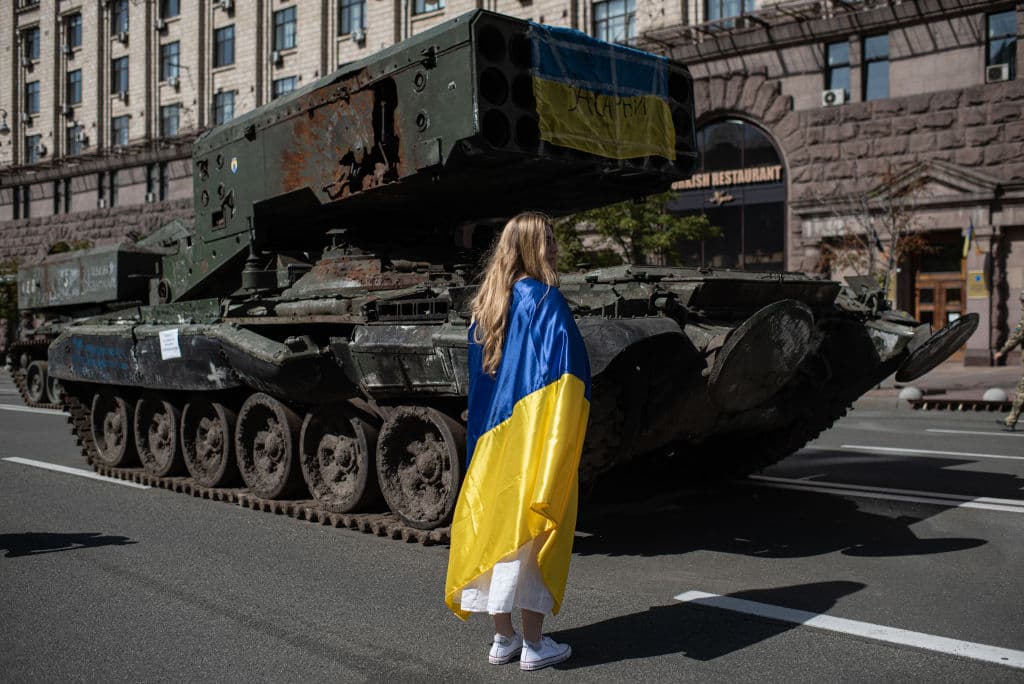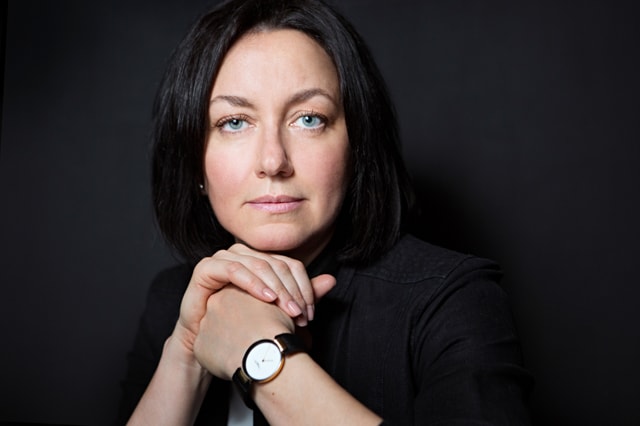Myroslava Barchuk: My War – Lifelines and Expensive Lessons

Editor’s Note: This guest essay is written within the PEN Ukraine “Dialogues on War” project, supported by the U.S. Embassy in Ukraine. The opinions expressed in the op-ed section are those of the authors. They do not purport to reflect the opinions of the Kyiv Independent.
I caught the first glimpse of light in the haze of war early in the morning of Feb. 26.
The hardest battles for Vasylkiv were fought throughout the night not too far from our village in Kyiv Oblast. We saw flashes in the sky and heard explosions, machine gun bursts, and the hollow sound of a plane falling that shook the walls of our house.
Later, we learned that it was the sound of our Air Force shooting down a Russian Il-76 with troops onboard. We also learned that a Russian subversive group disguised as Ukrainian police officers shot members of Ukraine’s territorial defense dead at a checkpoint near Vasylkiv.
That night, I fell asleep for just a few hours shortly before dawn, then woke up from the bright sun, grabbed my phone, and read the news.
Battles against Russian forces took place overnight in Kyiv, near Beresteiska metro station. A Russian missile hit a residential block in Kyiv’s Solomianskyi district. A bridge on the Zhytomyr Highway near Stoianka was blown up by Ukrainian forces to prevent enemy machinery from getting to Kyiv.
We needed to buy supplies, medicine, and dog food.
The atmosphere was palpable in the first grocery store. Customers were pushing their carts as they all scrolled on their phones. Everyone was trying to get in touch with their loved ones. The polyphony of voices and snippets of conversation made up the dark chronicles of the time.
Someone’s children were crossing the border, another person’s parents had already found themselves under Russian occupation, and yet another person was telling his wife that nothing was left in the store but sturgeon and red caviar.
The grocery store had switched off its payment terminals and was only taking cash. Since all the cash had been raked out of the ATMs long before, I had to leave with nothing.
I went to another store only to end up in another throng of anxious people. People rushed to grab themselves freshly-baked baguettes and dark wholemeal loaves. I stood in the half-empty vegetable section. A young man in civilian clothing with a Kalashnikov slung over his back was putting bananas into a plastic bag.
It was then that a man in a white shirt, perhaps the store administrator, came out of nowhere.
“Please, take as much as you need. There will be enough bread. There will be enough meat and milk. We’ll fix it, we are going to feed everyone,” he said in a loud, soothing tone, addressing no one in particular.
Meanwhile, two saleswomen stocked shelves with milk and sour cream, delivered miraculously to the store after a night of shelling in embattled Kyiv.
“How you doing, Olenka?” One of them asked. “Fine. Gonna beat ‘em!” Her colleague replied. They both laughed.
This was the first lifeline in the midst of the frantic stream that had been washing away my old life at that moment. Your safe, reliable, and well-thought-out world can easily collapse in two days, but a couple of voices may emerge from the chaos and, unwittingly, bring you back to your senses.
My every perception of the Ukrainian people, my every complaint against them, was unjustified.
I realized this in the first days of the full-scale war, not from photos and videos from the frontlines, but from those of the volunteers that delivered supplies to besieged Chernihiv despite the danger, the sacrifices of the medics and rescuers from Kharkiv and Mariupol, filmed by Mstyslav Chernov and Yevhen Malolietka, the valor of the pro-Ukrainian protestors in temporarily occupied Kherson, and many more manifestations of fortitude I could only wish I had myself.
I came across a video in a local group chat of our soldiers defeating a Russian subversive group near the edge of Chernechyi forest. It showcased such passion and courage that I watched it on repeat five times before I recognized its protagonists: the boys I so often argued with in peacetime over their loud music (sometimes Russian pop, by the way) at our local beach.
We, Ukrainians, possess a critical character trait. It’s like a muscle, worked out in the sequence of our revolutions. In times of shared threat, our individualistic, fragmented, and atomized society instantly transforms into a monolith.
I can’t explain how it works or what invisible threads sew the country together so quickly. Regardless, there is no need for any pompous office to call for unity: this miracle ascends upon us on its own.
Since the start of Russia’s full-scale war, we have all learned a few simple, yet important, lessons.
The main lesson is rather obvious, as any conclusion derived from repeated mistakes is bound to be. We have finally understood that the only way for us to survive is to defeat our murderous neighbor who makes no secret of its genocidal desire to “find a final solution to the Ukrainian Question.”
A war of independence is nothing new for us: we have fought it for many centuries, in spite of how aggressively the enemy tries to erase this fact from our collective memory. Any attempt to wait it out or compromise will just postpone this war of decolonization, leaving it to be fought by our children and strengthening our opponent.
While our forces are far from equal, the brunt of defeating Russian fascism has fallen to us, just as David defeated Goliath notwithstanding the doubts and admonitions of King Saul.
In our case, “Saul” is the Western politicians and intellectuals who chant mantras about the “invincibility of Russia” and normalize evil. “Saul” is also the moral blindness of Pope Francis and international human rights organizations that equate good and evil by blurring the line between them.
Ukraine’s Armed Forces have destroyed the myth about the world’s “second-best army.” We’ve seen Russian forces as the military with no honor or dignity: they kill civilians when they are unable to win on the battlefield, they raze peaceful cities to the ground with missiles and artillery, and they torture and slaughter prisoners of war.
You could post facts from history books in our present-day newsfeeds and nobody would be able to tell the difference.
We can recognize today’s Mariupol, Kharkiv, Mykolaiv, and Zaporizhzhia, our every burnt city and village, in the memoir of Mikhail Muravyov, who brought the Red Guard to Ukraine in 1918:
“We come with fire and sword to make the Soviet power felt. I took the city, I hit churches and palaces… I spared no one! On January 28, the Kyiv Duma asked for a ceasefire. In retaliation, I ordered to choke them with gas. Hundreds, or probably even thousands of generals were relentlessly murdered… We could have stopped the wrath of revenge, but we did not because being ruthless is our motto!”
As Muravyov’s soldiers fled Kyiv ahead of advancing German troops, surviving residents reported endless columns of carts carrying loot.
We caught the tail end of that column in Kyiv Oblast as Russia’s military withdrew in March 2022, carrying off gadgets, furniture, handbags, and even makeup. Russian ships stealing Ukrainian grain are at the end of this century-long caravan.
One more important lesson, therefore, is that we should be aware of the historical continuity of these Russian convoys, chock full of looted Ukrainian wealth.
These insights have come at a steep price. Could the price at least have been a bit smaller? Could our emancipation from Russia have been less bloody, or without bombardments?
These are questions I have no answer to. I only know, as did Olenka on Feb. 26, that we’re definitely “gonna beat ‘em.”









